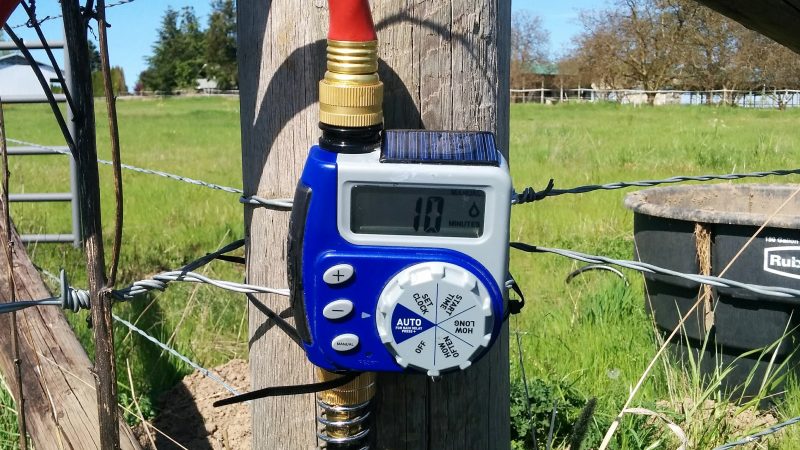Watering the garden or the lawn is one of those springtime chores that is way more appealing early in the season than later. As the growing season grinds along, a chore that seemed life-giving and satisfying becomes, well, just another chore, and plants often suffer for it.
Automating the watering task can be as simple as buying a little electronic timer valve that turns on the flow at the appointed times. [A1ronzo] converted his water hose timer to solar power. Most such timers are very similar, with a solenoid-operated pilot valve in line with the water supply and an electronic timer of some sort. The whole thing is quite capable of running on a pair of AA batteries, but rather than wasting money on new batteries several times a season, he slipped a LiPo pack and a charge controller into the battery case slot and connected a small solar panel to the top of the controller.
The LiPo is a nominal 3.7-volt pack, so he did a little testing to make sure the timer would be OK with the higher voltage. The solar panel sits on top of the case, and the whole thing should last for years. And bonus points for never having to replace a timer that you put away at the end of the season with batteries still in it, only to have them leak. Ask us how we know.
Like the best of hacks, this one is quick, easy and cheap — $15 in parts, aside from the timer. There are more complicated irrigation solutions, of course, one of which even won the Hackaday Prize once upon a time. But this one has us ordering parts to build our own right now.
















Awesome – solar-charged edge devices are fantastic!
But I wonder, do you really need the charge density of a LiPo there? For stationary and unattended applications, could it make more sense to use a nickel chemistry? Or maybe even EDLCs?
Using a simple USB charger for solar panel is definitely not optimal, you may want to use a MPPT charger for this, like the spv1050 doing all the hardwork for you.
An MPPt charger can give you 25% more power, but on small systems it’s often simpler and cheaper to just buy 25% more panel.
Agreed
Market this! I have been trying to find a solar powered\recharged timer for years! The battery powered ones eat through AAs so fast I stopped using them.
Already done :-D
I have one since 1month without issue.
https://fr.aliexpress.com/item/1Pc-Solar-Power-Home-Garden-Auto-Water-Saving-Irrigation-Controller-LCD-Digital-Watering-Timer-For-Garden/32806122948.html?spm=a2g0s.9042311.0.0.27426c37u5oF2N
I feel like this is a missed opportunity to steal energy from the water pressure using an inline impeller hooked up to a dynamo/generator. The only catch is you’d need to make sure the unit powers up frequently enough to open the valve and top off the battery.
Good point, but if the battery die, you don’t have chance to open it and charge it :)
But if the solar panel woudn’t be enough, it can be used for quick charge to full (combine it)…
I like the idea and implementation but does it work? 3 months down the line is the voltage still 4.2? I’ve had lots of problems with solar panels making the voltage for circuits but not the current requirements, then they brown out, repeatedly. A nice simple reliable implementation would be nice.
I have some of those, set to run one or more times per day. Costco alkalines generally last me more than one season.
Not that that is any reason not to hack a solar panel onto one.
+1 on both points.
Maybe because they are older units, but my water timers use “C” or “D” cells.
It has been a couple of years since I last used them, but IIRC a pair of batteries lasted a growing season.
While I appreciate the enthusiasm, Hunter Node DC latching solenoids and controllers (9v x 2) are hard to beat for remote usecases. (no, I don’t work for them) They also have a solar option and are very well made. I have Node controllers that have run for two years now without a battery change. These cheapy hose bib type controller/solenoid combos pose backflow risks (read: might be illegal depending on where you live and how you use them) and are prone to catastrophic failure. These will flood your yard sooner or later. Skimping on plumbing is generally speaking ill-advised.